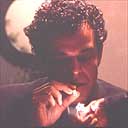
Author: Leo Tolstoy (1828-1910) was born into an aristocratic Russian family and, after a somewhat dissipated adolescence, began publishing in his mid-20s. His first work, the autobiographical Childhood, emerged in 1852. After a spell in the military (including action in the Crimean war) and a European tour, Tolstoy returned to his family estate, Yasnaya Polyana, to put into practice the progressive social and philosophical ideas he had acquired. His best-known novels followed: War and Peace (completed 1869) and Anna Karenina (completed 1877). In 1878, Tolstoy underwent a religious conversion and entered the Orthodox church (he would eventually be excommunicated in 1901). He took to writing short stories and novels, mostly in the guise of peasant folk tales and moral fables. The Death of Ivan Ilych was published in 1886.
Story: Arguably the purest distillation of Tolstoy's own struggle with metaphysical issues, The Death of Ivan Ilych is a blunt communication of the terror and agony of an apparently content and successful judge struck down by an incurable disease: "Ivan Ilych's life had been the most simple and most ordinary and therefore most terrible." After a lifetime of acquiring material comforts, the hollowness and futility of Ivan's existence is exposed by the approach of his demise. Alienated from everyone around him - apart from his servant Gerasim - Ivan undergoes a profound spiritual awakening through the unrelieved horror of his contemplations.
Film-makers: Bernard Rose (b1960) began making features in the 1980s after a string of celebrated music videos (including Relax for Frankie Goes to Hollywood). However, it took a Hollywood adaptation of Clive Barker's Candyman (1992) for him to make his mark. A disastrous adaptation of Tolstoy's Anna Karenina (1997) followed, motivating Rose to turn to low-budget digital video production. Lead actor Danny Huston, the son of legendary film director John and half-brother of Anjelica, had had a previously undistinguished career as an actor and director, but co-lead Peter Weller, once the body of Robocop (1987), had a long record of independent productions alongside Hollywood work. Lisa Enos, Rose's partner, co-wrote, produced and acted in the film.
How book and film compare: Rose merges Tolstoy's account of a slow, lingering death with a savage critique of Hollywood culture. Ivan Ilych is no longer an "ordinary" man, but has transmuted into Ivan Beckmann, an LA superagent, whose colleagues initially refuse to believe he's died of cancer rather than a drug overdose. In flashback, the details of Beckmann's isolation and desperation become cripplingly clear. Key scenes survive from Tolstoy's original - the dying man's terrified screaming, his alienation from his family, the final comfort provided by a paid helper.
Inspirations and influences: Films targeting the cynicism of commercial cinema production have surfaced regularly, from The Bad and the Beautiful to Swimming with Sharks. But none of them have harnessed their insight to a character with such a degree of self-knowledge as Beckmann attains. This is, in fact, characteristic of the digital video sector. Films as varied as Festen (1998), The Blair Witch Project (1999) and Dogville (2002) have all benefited from the raw intimacy the technology facilitates.

